广东省深圳市 Module 3 Unit 5 Visiting the moon 课件(1)
文档属性
| 名称 | 广东省深圳市 Module 3 Unit 5 Visiting the moon 课件(1) | 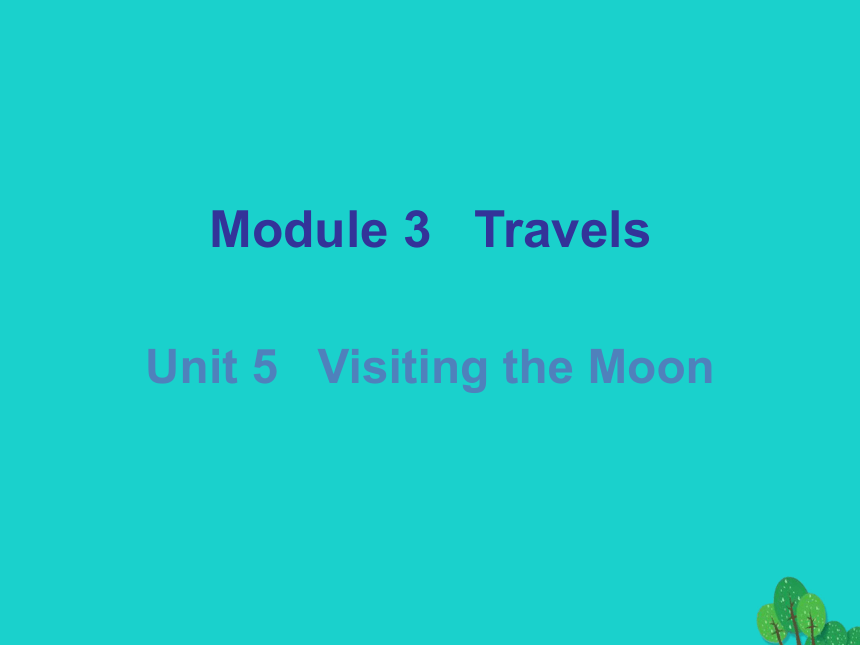 | |
| 格式 | zip | ||
| 文件大小 | 128.5KB | ||
| 资源类型 | 教案 | ||
| 版本资源 | 牛津深圳版 | ||
| 科目 | 英语 | ||
| 更新时间 | 2016-12-13 00:00:00 | ||
图片预览

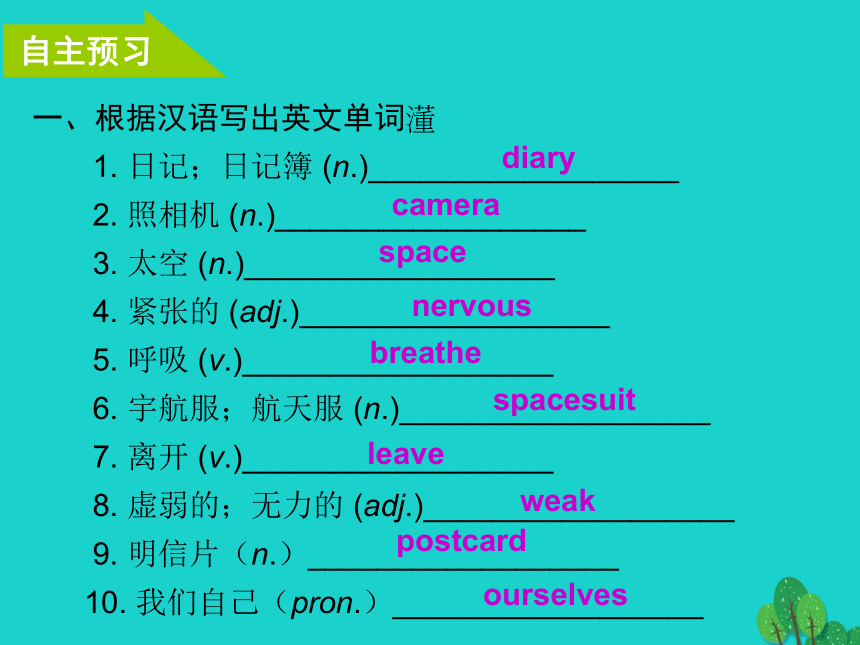
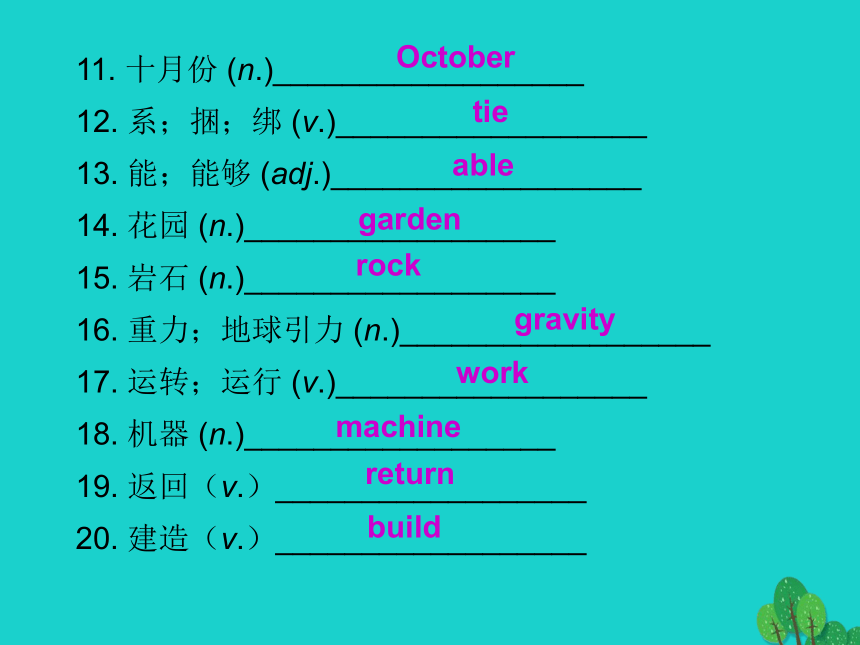
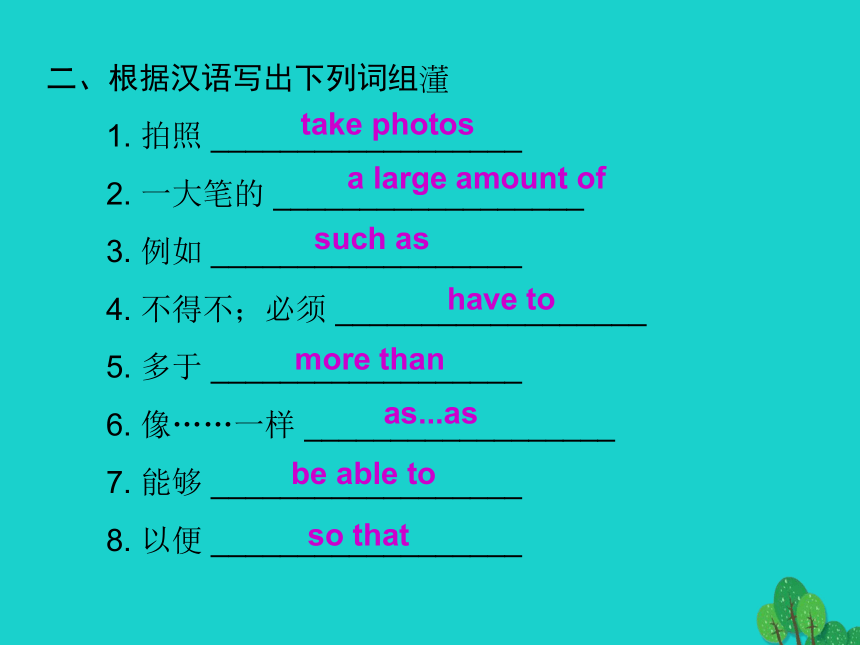
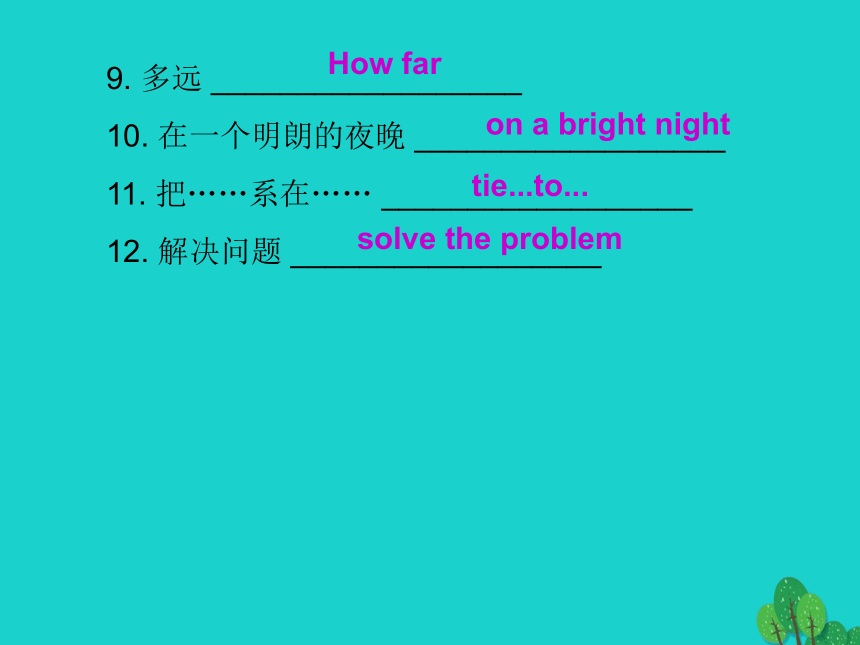
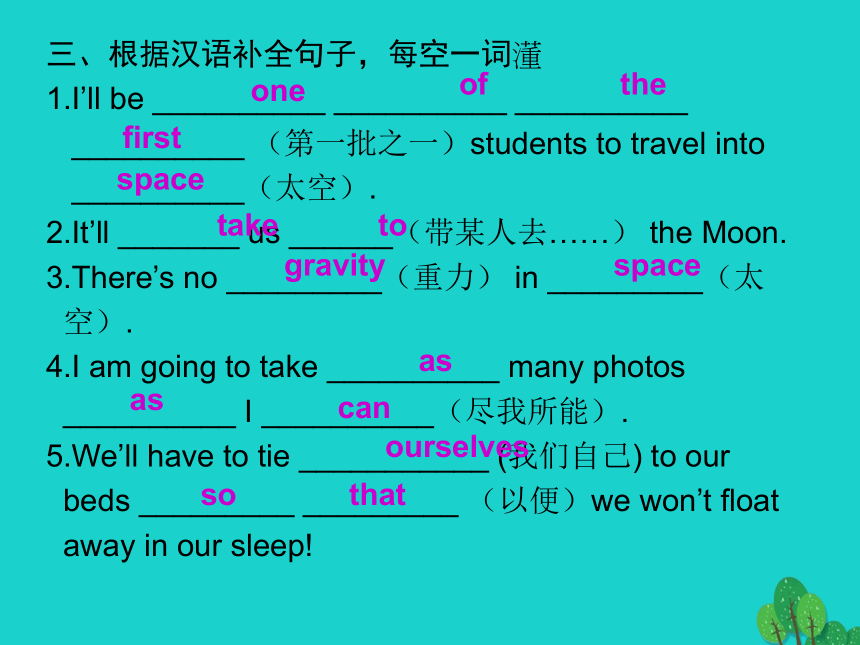
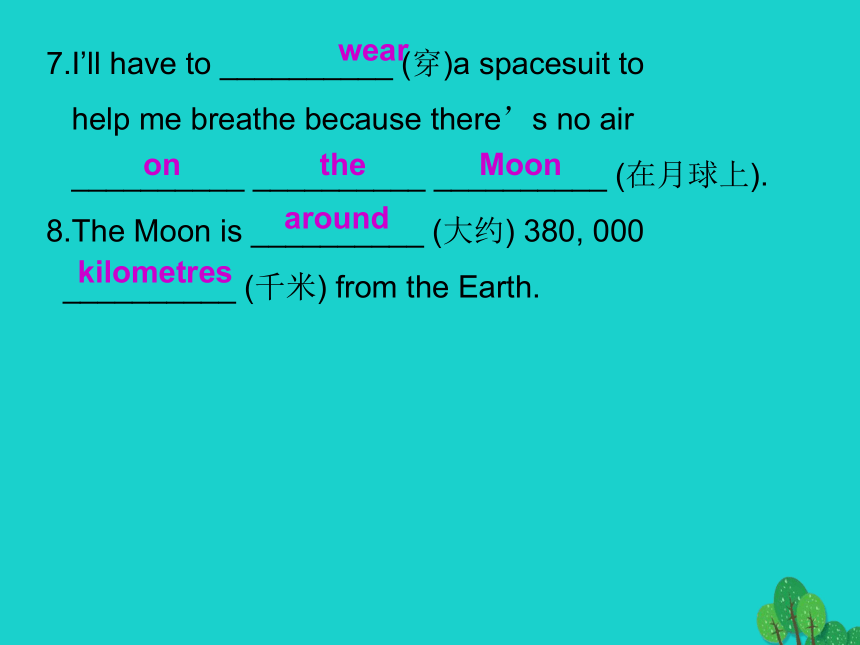

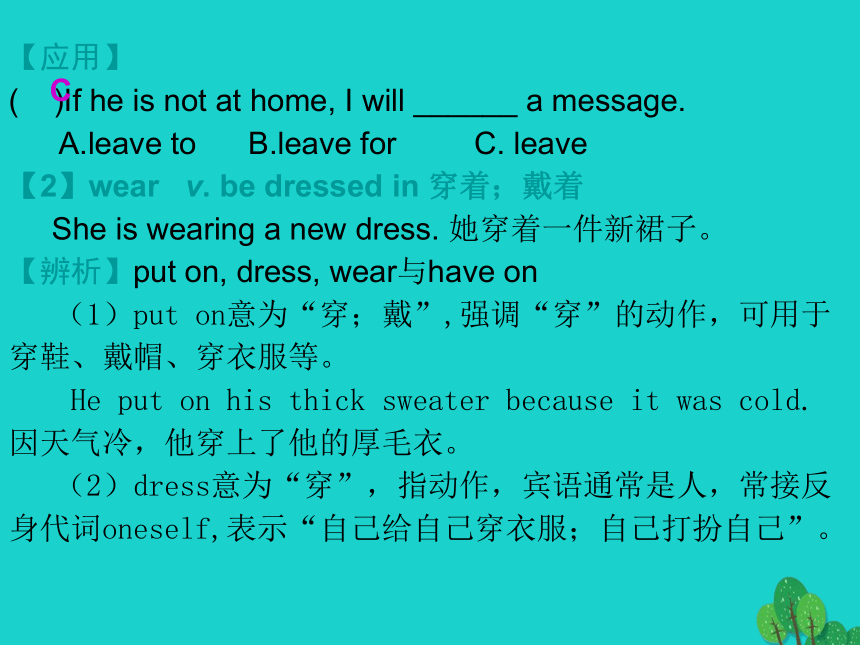
文档简介
课件27张PPT。Unit 5 Visiting the MoonModule 3 Travels自主预习一、根据汉语写出英文单词?
1. 日记;日记簿 (n.)__________________
2. 照相机 (n.)__________________
3. 太空 (n.)__________________
4. 紧张的 (adj.)__________________
5. 呼吸 (v.)__________________
6. 宇航服;航天服 (n.)__________________
7. 离开 (v.)__________________
8. 虚弱的;无力的 (adj.)__________________
9. 明信片(n.)__________________
10. 我们自己(pron.)__________________diarycameraspacenervousbreathespacesuitleaveweakpostcardourselves 11. 十月份 (n.)__________________
12. 系;捆;绑 (v.)__________________
13. 能;能够 (adj.)__________________
14. 花园 (n.)__________________
15. 岩石 (n.)__________________
16. 重力;地球引力 (n.)__________________
17. 运转;运行 (v.)__________________
18. 机器 (n.)__________________
19. 返回(v.)__________________
20. 建造(v.)__________________Octobertiegardenrockgravityworkmachinereturnbuildable二、根据汉语写出下列词组?
1. 拍照 __________________
2. 一大笔的 __________________
3. 例如 __________________
4. 不得不;必须 __________________
5. 多于 __________________
6. 像……一样 __________________
7. 能够 __________________
8. 以便 __________________take photosa large amount ofsuch ashave tomore thanas...asbe able toso that 9. 多远 __________________
10. 在一个明朗的夜晚 __________________
11. 把……系在…… __________________
12. 解决问题 __________________How faron a bright nighttie...to...solve the problem三、根据汉语补全句子,每空一词?
1.I’ll be __________ __________ __________
__________ (第一批之一)students to travel into
__________(太空).
2.It’ll _______ us ______(带某人去……) the Moon.
3.There’s no _________(重力) in _________(太
空).
4.I am going to take __________ many photos
__________ I __________(尽我所能).
5.We’ll have to tie ___________ (我们自己) to our
beds _________ _________ (以便)we won’t float
away in our sleep!oneofthefirstspacetaketogravityspaceasascanourselvessothat7.I’ll have to __________ (穿)a spacesuit to
help me breathe because there’s no air
__________ __________ __________ (在月球上).
8.The Moon is __________ (大约) 380, 000
__________ (千米) from the Earth.wearon theMoonaroundkilometres【1】leave v. go away from a place 离开; forget to bring something, either intentionally or by neglect or forgetfulness 忘带
He left home in a hurry. 他匆忙离开了家。
Leave your address, please. 请把你的地址留下。
He left his homework at home last Monday. 上周一他把功课忘在家里了。
【辨析】leave与leave for
(1)leave指离开某处。
I will leave Guangzhou. 我将要离开广州。
(2)leave for指离开到某处去。
I will leave for Guangzhou. 我将要去广州。词汇精析要点梳理 词汇精析 【应用】
( )If he is not at home, I will ______ a message.
A.leave to B.leave for C. leave
【2】wear v. be dressed in 穿着;戴着
She is wearing a new dress. 她穿着一件新裙子。
【辨析】put on, dress, wear与have on
(1)put on意为“穿;戴”,强调“穿”的动作,可用于穿鞋、戴帽、穿衣服等。
He put on his thick sweater because it was cold. 因天气冷,他穿上了他的厚毛衣。
(2)dress意为“穿”,指动作,宾语通常是人,常接反身代词oneself,表示“自己给自己穿衣服;自己打扮自己”。CThe little girl is old enough to dress herself. 这小女孩足够大,可以自己穿衣服了。
(3)wear意为“穿着”,指状态,可以用进行时;宾语除衣帽鞋袜外,还可以是首饰、眼镜、发型等。?
She never wears green(clothes).
她从不穿绿色的衣服。
(4)have on意为“穿着”,指状态,没有进行时形式;宾语为代词时,只能放在on前;宾语为名词时,则可以放在on的前或后。
It’s a pretty hat you have on.
你戴的帽子很好看。【应用】
( )It’s very cold outside. ______ your sweater before going out.
A.Wear B.Dress C. Put on
【3】breathe v. draw air into and expel out of the lungs 呼吸
He breathed deeply before speaking again.
他深深吸了一口气,然后继续说下去。
【拓展】
(1)breath n. 气息;呼吸
I had no breath to call, so I waved to him to come. 我因呼吸急促而叫不出声,所以只好招手叫他过来。
(2)out of breath 喘不过气来
He was out of breath after running.
跑完步后他气喘吁吁。C【应用】
Fish cannot __________ (breath)without water.
【4】be able to=can 有能力做
He is able to swim after practising for one month.训练一个月以后他会游泳了。
【辨析】be able to 与 can
(1)be able to 强调通过努力而获得的能力;can则强调自身已具有的能力。
She can sing the song in English. 她能用英语唱这首歌。
He will be able to sing this song in English in a few hours, too. 几小时之后,他也将能用英语唱这首歌。breathe (2)can(过去时为could),只用于现在时和过去时 (could)中;be able to则可以用于各种时态中。
【应用】
He will ____________ (can, be able to )finish the work in an hour.
【5】take photos 拍照
Sit close together, I’ll take photos for you.
坐近一点,我来给你们拍照。
【拓展】
take pictures=take photos 拍照
take a photo/picture 照一张照片
take some photos/pictures 照一些照片be able to【应用】
What a nice place! Shall we _________________________
(拍些照片)?
【6】as...as...=be like 像……一样
as...as的中间接形容词或副词的原级,意为“像……一样;如同”。
He is as clever as his father. 他和他爸爸一样聪明。
【拓展】
not as/so...as(前者)不如(后者)
He is not as/so strong as me. 他没有我那么强壮。
【应用】
( )This dress is cheap. But it isn’t as ______ as
that one.?
A.cheap B.cheaper C.cheapesttake some photos/picturesA一般将来时
1. 一般将来时表示在将来某个时间将要发生的动作或存在的状态。它常与表示将来的时间状语如tomorrow, next week/month/year等连用
We will get there tomorrow. 我们明天将到那里。
What will happen next?下一步会发生什么?
2. 表示将来经常或反复发生的动作
I will come to see you every weekend.
我每个周末都会来看你的。 语法聚焦 语法精讲 3. be going to与will的用法区别
(1)be going to 和will都表示“将要”,为将来时标志,在一般情况下两者可以互换。
They will/are going to meet at the school gate at 8 tomorrow. 他们明天8点将在校门口会合。
(2)有迹象表示某事将要发生,或打算、计划、决定要做某事,一般用“be going to+动词原形”来表示。
We are going to watch the football game. 我们打算去看这场足球赛。
It’s going to be warmer later on. 晚些时候天气会更暖和。
(3)下列几种情况的将来时要用will而不用be going to。 ① 带有意愿色彩的将来时,常用will。
I will tell you the news. 我要把这消息告诉你。
② 问对方是否愿意,或表示客气的邀请或命令时,常用will。
Will you please close the window? 请把窗户关上,好吗?
③ 在有时间状语从句或条件状语从句的复合句中,如果主句是将来时,常用will。
Miss Li will tell you the answer if you ask her. 如果你去问李老师,她会告诉你答案的。
4. 一般将来时的特殊表达
一些表示位置转移的词,如go, come, leave, arrive, fly等,可以用现在进行时表示即将发生的动作。 They are flying to Wuhan tomorrow. 他们明天要飞往武汉。
My uncle is coming to have supper. 我叔叔要来吃晚饭。
Are you leaving tonight?你今晚要走吗?( )1.—My aunt ______ me to Europe for vacation
next month.
—Have a good time! (2015海南)
A.take B.took C.will take
( )2.I______ the shops. Can I get you anything?
(2015河北)
A.go to B.went to
C.have gone to D.am going toCD直击中考( )3.Stop smoking,Joe! You ______ yourself if
you keep on doing it like that! (2015重庆)
A.will kill B.have killed
C.kill D.killed
( )4. —Have you finished the poster for the
party?
—Not yet. I ______ it in two days.(2015山西)
A. finish
B. finished
C. will finish AC( )5. —Will Tony go skiing with us this Saturday?
—Sorry, I don’t know if he ______. But I
know he ______interest in sports.
(2015克拉玛依)
A.will go; is B.goes; is
C.goes; has D.will go;has no
( )6.I fell in love with Shanghai on my first trip,
so I decide I ______ in it in 10 years.
(2015 湖北)
A.will live B. lives C.lived D. has lived DA话题五 谈论太空之旅?
【常用词组】
1. travel into space 到太空旅游
2. travel by spaceship 乘太空船去旅游
3. without gravity 没有重力
4. wear spacesuit 穿宇航服
5. walk on the Moon 在月球上行走
6. take photos 拍照
7. help...breathe 帮助……呼吸
8. do exercises 锻炼
9. be able to 能够
10. grow vegetables 种植蔬菜 写作乐园【精彩句型】
1.We will travel into space.我们将去太空旅游。
2.I’ll be one of the first students to travel
into space.我将是第一批去太空旅游的学生中的其
中一人。
3.We’ll have to...because... 我们将不得不……因
为……
4.We’ll have to...so that... 我们将不得不……以
便……
5.I’m going to...as...as I can. 我将尽我所
能……【短文写作】
假设你将有一次去月球旅游的机会,请写一篇短文介绍一下你对即将到来的月球之旅的心情和计划。
提示:
1.描述你获得这次机会的心情;
2.谈谈你对月球的了解;
3.最后谈谈你在月球上的生活计划。
要求:条理清晰,语句通顺,意思连贯,不少于60词。【写作指导】
此篇作文以畅想去月球旅行前的心情和计划为主线,主要内容是说明心情和计划。写作内容渗透本单元的话题和语法——一般将来时。
在写作过程中要明确以下几点:
1.参考课文并进行合理想象,借鉴课文中的精彩句型,例如as...as I can, take photos, float away, without gravity等进行写作;
2.结合话题,作文中要正确使用一般将来时。【范文赏析】
I am so excited that I’ll be one of the first students to travel into space. I can’t wait. The Moon is around 380,000 kilometres from the Earth. We’ll go there by spaceship. There is no gravity on the Moon. It will be fun because we can float then. There is no air either. I’m going to walk on the Moon. So I will have to wear a spacesuit to help me breathe. I will grow some vegetables and bring some back to the Earth. I’m going to do exercises because I will get weak there. Last, I will take as many photos as I can. I am sure I will have a good time there.谢谢欣赏!
1. 日记;日记簿 (n.)__________________
2. 照相机 (n.)__________________
3. 太空 (n.)__________________
4. 紧张的 (adj.)__________________
5. 呼吸 (v.)__________________
6. 宇航服;航天服 (n.)__________________
7. 离开 (v.)__________________
8. 虚弱的;无力的 (adj.)__________________
9. 明信片(n.)__________________
10. 我们自己(pron.)__________________diarycameraspacenervousbreathespacesuitleaveweakpostcardourselves 11. 十月份 (n.)__________________
12. 系;捆;绑 (v.)__________________
13. 能;能够 (adj.)__________________
14. 花园 (n.)__________________
15. 岩石 (n.)__________________
16. 重力;地球引力 (n.)__________________
17. 运转;运行 (v.)__________________
18. 机器 (n.)__________________
19. 返回(v.)__________________
20. 建造(v.)__________________Octobertiegardenrockgravityworkmachinereturnbuildable二、根据汉语写出下列词组?
1. 拍照 __________________
2. 一大笔的 __________________
3. 例如 __________________
4. 不得不;必须 __________________
5. 多于 __________________
6. 像……一样 __________________
7. 能够 __________________
8. 以便 __________________take photosa large amount ofsuch ashave tomore thanas...asbe able toso that 9. 多远 __________________
10. 在一个明朗的夜晚 __________________
11. 把……系在…… __________________
12. 解决问题 __________________How faron a bright nighttie...to...solve the problem三、根据汉语补全句子,每空一词?
1.I’ll be __________ __________ __________
__________ (第一批之一)students to travel into
__________(太空).
2.It’ll _______ us ______(带某人去……) the Moon.
3.There’s no _________(重力) in _________(太
空).
4.I am going to take __________ many photos
__________ I __________(尽我所能).
5.We’ll have to tie ___________ (我们自己) to our
beds _________ _________ (以便)we won’t float
away in our sleep!oneofthefirstspacetaketogravityspaceasascanourselvessothat7.I’ll have to __________ (穿)a spacesuit to
help me breathe because there’s no air
__________ __________ __________ (在月球上).
8.The Moon is __________ (大约) 380, 000
__________ (千米) from the Earth.wearon theMoonaroundkilometres【1】leave v. go away from a place 离开; forget to bring something, either intentionally or by neglect or forgetfulness 忘带
He left home in a hurry. 他匆忙离开了家。
Leave your address, please. 请把你的地址留下。
He left his homework at home last Monday. 上周一他把功课忘在家里了。
【辨析】leave与leave for
(1)leave指离开某处。
I will leave Guangzhou. 我将要离开广州。
(2)leave for指离开到某处去。
I will leave for Guangzhou. 我将要去广州。词汇精析要点梳理 词汇精析 【应用】
( )If he is not at home, I will ______ a message.
A.leave to B.leave for C. leave
【2】wear v. be dressed in 穿着;戴着
She is wearing a new dress. 她穿着一件新裙子。
【辨析】put on, dress, wear与have on
(1)put on意为“穿;戴”,强调“穿”的动作,可用于穿鞋、戴帽、穿衣服等。
He put on his thick sweater because it was cold. 因天气冷,他穿上了他的厚毛衣。
(2)dress意为“穿”,指动作,宾语通常是人,常接反身代词oneself,表示“自己给自己穿衣服;自己打扮自己”。CThe little girl is old enough to dress herself. 这小女孩足够大,可以自己穿衣服了。
(3)wear意为“穿着”,指状态,可以用进行时;宾语除衣帽鞋袜外,还可以是首饰、眼镜、发型等。?
She never wears green(clothes).
她从不穿绿色的衣服。
(4)have on意为“穿着”,指状态,没有进行时形式;宾语为代词时,只能放在on前;宾语为名词时,则可以放在on的前或后。
It’s a pretty hat you have on.
你戴的帽子很好看。【应用】
( )It’s very cold outside. ______ your sweater before going out.
A.Wear B.Dress C. Put on
【3】breathe v. draw air into and expel out of the lungs 呼吸
He breathed deeply before speaking again.
他深深吸了一口气,然后继续说下去。
【拓展】
(1)breath n. 气息;呼吸
I had no breath to call, so I waved to him to come. 我因呼吸急促而叫不出声,所以只好招手叫他过来。
(2)out of breath 喘不过气来
He was out of breath after running.
跑完步后他气喘吁吁。C【应用】
Fish cannot __________ (breath)without water.
【4】be able to=can 有能力做
He is able to swim after practising for one month.训练一个月以后他会游泳了。
【辨析】be able to 与 can
(1)be able to 强调通过努力而获得的能力;can则强调自身已具有的能力。
She can sing the song in English. 她能用英语唱这首歌。
He will be able to sing this song in English in a few hours, too. 几小时之后,他也将能用英语唱这首歌。breathe (2)can(过去时为could),只用于现在时和过去时 (could)中;be able to则可以用于各种时态中。
【应用】
He will ____________ (can, be able to )finish the work in an hour.
【5】take photos 拍照
Sit close together, I’ll take photos for you.
坐近一点,我来给你们拍照。
【拓展】
take pictures=take photos 拍照
take a photo/picture 照一张照片
take some photos/pictures 照一些照片be able to【应用】
What a nice place! Shall we _________________________
(拍些照片)?
【6】as...as...=be like 像……一样
as...as的中间接形容词或副词的原级,意为“像……一样;如同”。
He is as clever as his father. 他和他爸爸一样聪明。
【拓展】
not as/so...as(前者)不如(后者)
He is not as/so strong as me. 他没有我那么强壮。
【应用】
( )This dress is cheap. But it isn’t as ______ as
that one.?
A.cheap B.cheaper C.cheapesttake some photos/picturesA一般将来时
1. 一般将来时表示在将来某个时间将要发生的动作或存在的状态。它常与表示将来的时间状语如tomorrow, next week/month/year等连用
We will get there tomorrow. 我们明天将到那里。
What will happen next?下一步会发生什么?
2. 表示将来经常或反复发生的动作
I will come to see you every weekend.
我每个周末都会来看你的。 语法聚焦 语法精讲 3. be going to与will的用法区别
(1)be going to 和will都表示“将要”,为将来时标志,在一般情况下两者可以互换。
They will/are going to meet at the school gate at 8 tomorrow. 他们明天8点将在校门口会合。
(2)有迹象表示某事将要发生,或打算、计划、决定要做某事,一般用“be going to+动词原形”来表示。
We are going to watch the football game. 我们打算去看这场足球赛。
It’s going to be warmer later on. 晚些时候天气会更暖和。
(3)下列几种情况的将来时要用will而不用be going to。 ① 带有意愿色彩的将来时,常用will。
I will tell you the news. 我要把这消息告诉你。
② 问对方是否愿意,或表示客气的邀请或命令时,常用will。
Will you please close the window? 请把窗户关上,好吗?
③ 在有时间状语从句或条件状语从句的复合句中,如果主句是将来时,常用will。
Miss Li will tell you the answer if you ask her. 如果你去问李老师,她会告诉你答案的。
4. 一般将来时的特殊表达
一些表示位置转移的词,如go, come, leave, arrive, fly等,可以用现在进行时表示即将发生的动作。 They are flying to Wuhan tomorrow. 他们明天要飞往武汉。
My uncle is coming to have supper. 我叔叔要来吃晚饭。
Are you leaving tonight?你今晚要走吗?( )1.—My aunt ______ me to Europe for vacation
next month.
—Have a good time! (2015海南)
A.take B.took C.will take
( )2.I______ the shops. Can I get you anything?
(2015河北)
A.go to B.went to
C.have gone to D.am going toCD直击中考( )3.Stop smoking,Joe! You ______ yourself if
you keep on doing it like that! (2015重庆)
A.will kill B.have killed
C.kill D.killed
( )4. —Have you finished the poster for the
party?
—Not yet. I ______ it in two days.(2015山西)
A. finish
B. finished
C. will finish AC( )5. —Will Tony go skiing with us this Saturday?
—Sorry, I don’t know if he ______. But I
know he ______interest in sports.
(2015克拉玛依)
A.will go; is B.goes; is
C.goes; has D.will go;has no
( )6.I fell in love with Shanghai on my first trip,
so I decide I ______ in it in 10 years.
(2015 湖北)
A.will live B. lives C.lived D. has lived DA话题五 谈论太空之旅?
【常用词组】
1. travel into space 到太空旅游
2. travel by spaceship 乘太空船去旅游
3. without gravity 没有重力
4. wear spacesuit 穿宇航服
5. walk on the Moon 在月球上行走
6. take photos 拍照
7. help...breathe 帮助……呼吸
8. do exercises 锻炼
9. be able to 能够
10. grow vegetables 种植蔬菜 写作乐园【精彩句型】
1.We will travel into space.我们将去太空旅游。
2.I’ll be one of the first students to travel
into space.我将是第一批去太空旅游的学生中的其
中一人。
3.We’ll have to...because... 我们将不得不……因
为……
4.We’ll have to...so that... 我们将不得不……以
便……
5.I’m going to...as...as I can. 我将尽我所
能……【短文写作】
假设你将有一次去月球旅游的机会,请写一篇短文介绍一下你对即将到来的月球之旅的心情和计划。
提示:
1.描述你获得这次机会的心情;
2.谈谈你对月球的了解;
3.最后谈谈你在月球上的生活计划。
要求:条理清晰,语句通顺,意思连贯,不少于60词。【写作指导】
此篇作文以畅想去月球旅行前的心情和计划为主线,主要内容是说明心情和计划。写作内容渗透本单元的话题和语法——一般将来时。
在写作过程中要明确以下几点:
1.参考课文并进行合理想象,借鉴课文中的精彩句型,例如as...as I can, take photos, float away, without gravity等进行写作;
2.结合话题,作文中要正确使用一般将来时。【范文赏析】
I am so excited that I’ll be one of the first students to travel into space. I can’t wait. The Moon is around 380,000 kilometres from the Earth. We’ll go there by spaceship. There is no gravity on the Moon. It will be fun because we can float then. There is no air either. I’m going to walk on the Moon. So I will have to wear a spacesuit to help me breathe. I will grow some vegetables and bring some back to the Earth. I’m going to do exercises because I will get weak there. Last, I will take as many photos as I can. I am sure I will have a good time there.谢谢欣赏!
